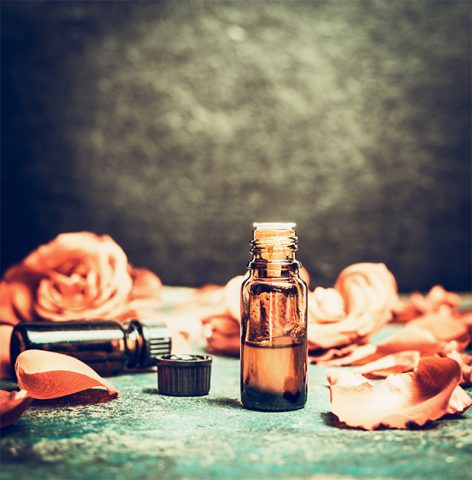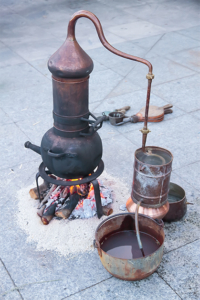Essential Oils Demystified

Aromatherapy has hit mainstream! While enjoying the lovely scents and medicinal benefits of essential oils, many enthusiasts have become baffled with the amount of information out there, and what it all means. To answer some questions, we think it’s important to demystify some of the more common concerns and move on to enjoying the beauty of these oils without all of the confusion.
Selecting an oil:
 You may not understand the differences in essential oils from one brand to another. When selecting an oil, there are several things to look for. It is important to have as much information on our bottles as possible. This includes the common name, the latin name (as the common name may have different species); the method of extraction and the region from where it was sourced. Specifying the species is important as different ones may provide slightly different therapeutic properties. For example, observe the subtle differences between the 4 lavender species we carry:
You may not understand the differences in essential oils from one brand to another. When selecting an oil, there are several things to look for. It is important to have as much information on our bottles as possible. This includes the common name, the latin name (as the common name may have different species); the method of extraction and the region from where it was sourced. Specifying the species is important as different ones may provide slightly different therapeutic properties. For example, observe the subtle differences between the 4 lavender species we carry:
- True Lavender: Lavandula angustifolia Grown wild in high altitudes. It is relatively rare, varies year to year and supplies are limited (calming, muscular relaxant, anti-inflammatory).
- Lavender: Lavandula officianalis Standardized to be the same every year by balancing the percentage of linanlool & linalyl acetate in every batch (similar properties to True Lavender).
- Spike Lavender: Lavandula spica Grown easily at lower altitudes (has a higher camphor content, so is more anti-septic and anti-inflammatory than the others).
- Lavandin: Lavandula hybrida This is produced by crossing True Lavender & Spike Lavender. It is easier to grow, and yields more than twice as much oil from the plant, which makes it the most economical lavender we carry (antibacterial, tonic to the nervous system; has a more powerful, sharper scent than officianalis or angustifolia).
It is also important for the label to reveal whether the oil is organic, wild crafted, or conventionally farmed without chemicals. Such information may help you to choose the one that is perfect for you. And of course, make it is a pleasure to smell the oils, so make sure you smell the essential oil before buying it if possible!
Prices can vary as well, and sometimes this has to do with the extraction methods. Extraction of the oils from the plant material can differ significantly. In order to get the volatile oils out of the plant, several methods are used. Some of these methods produce essential oils, and some produce aromatic extracts. (Although technically different, some use these terms interchangeably.)
The oils we carry vary in extraction methods. Here’s a quick description that may help you understand all the terms:
- Cold Pressed – no heat required, very simple, used for pressing citrus peels.
- C02 Extraction – does not involve heat, technologically sophisticated, produces a gentle extraction. The chemistry of this resulting oil differs from the other methods used as it is said to yield the highest therapeutic quality. Although sustainable, it is a relatively expensive procedure.
- Steam Distillation – steam is sent through the plant material, essential oils separate from the plant as the oil is not water soluble. This is quite economical.
- Solvent Extraction – generally used when the plant (flower) is too delicate to be extracted by steam distillation. Known as an “Absolute” oil, these oils are treated with a mineral solvent, usually hexane. Alcohol distillation then removes the waxes and most of the solvent. These absolutes are typically used in perfuming.
All of this information may help you understand why you should be wary of an “essential oil bottle” labeled “Perfume Oil”. This is misleading and does not explain what the oil is. These oils may have artificial oils, alcohol, or vegetable oils in them, so therefore may not be a pure essential oil. The prices may reflect this, as anyone who has wanted to purchase a pure rose essential oil finds out quite quickly that a fake will be very cheap, while the real thing will likely reflect in the price.
Lastly, and most importantly, “Therapeutic Grade” is a gray zone too… Many well-intentioned suppliers will use that term to genuinely communicate their product is authentic, pure and can be used in aromatherapy. Yet the marketing world has contaminated the term these days, which can be quite misleading. Anyone company can use it on their labels, but the industry is not regulated. Generally, in the industry, this is a term representative of high-quality oils, though solely counting on the term “therapeutic grade” does not guarantee this.
Although there is much, much more to this subject, we hope this to be a helpful introduction in determining what oils to choose, and what questions to ask the next time you find yourself looking for that perfect oil!
References:
Jane Buckles’s “ClinicalAromatherapy: Essential Oils in Practice”
“Common Scents Journal” 1998
Jeanne Rose’s ‘375 Essential Oils and Hydrosols”


